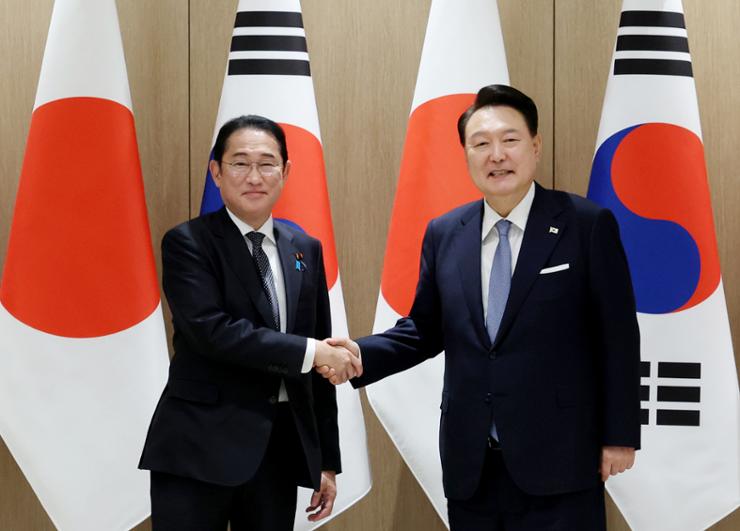WNAM REPORT: President Yoon Suk Yeol and Japanese Prime Minister Fumio Kishida held a summit in Seoul, Friday, where they reaffirmed their commitment to strengthening bilateral partnerships that will continue beyond Kishida’s term, which ends later this month.
It was the 12th meeting between the two leaders and possibly the final one before Kishida leaves office. The Japanese prime minister’s term is set to expire at the end of September, following his decision to withdraw from the ruling Liberal Democratic Party’s leadership race and not seek re-election.
Details of the summit agenda were not officially announced, but the two leaders are presumed to have discussed ways to bolster bilateral relations as next year marks the 60th anniversary of the normalization of diplomatic ties.
Several Japanese media reports suggested that the two governments may sign an agreement to cooperate in rescuing citizens from conflict zones. Last October, 51 Japanese citizens were evacuated from Israel by Korea’s military transport plane amid the Hamas conflict.
Speculation also arose that Kishida may express gratitude for the Korean government’s cooperation in Tokyo’s bid to inscribe the Sado mines on the UNESCO World Heritage list. The controversial wartime site, where Koreans were forced to work during Japan’s colonial rule, was added to the UNESCO list in July with the Korean government’s consent.
The summit was followed by a dinner hosted by Yoon, attended by first lady Kim Keon Hee and her Japanese counterpart Yuko Kishida.
The two leaders plan to meet with Korean and Japanese exchange students at Seoul National University, Yoon’s alma mater, on Saturday. This engagement will take place before Kishida concludes his two-day visit.
Kishida’s trip was arranged at Japan’s request, as he expressed a willingness to meet Yoon, according to the presidential office.
The Japanese prime minister, who has faced sluggish approval ratings and political scandals at home, has highlighted the normalization of ties with Korea as a major accomplishment of his administration.
As such, the outgoing prime minister’s visit was apparently intended to highlight his legacy.
For Yoon, who has also used diplomacy as a cornerstone of his support, the summit was seen as an opportunity to champion his efforts to mend frayed relations and sustain the partnership despite the upcoming leadership change in Tokyo.
Korea-Japan bilateral relations have seen significant improvement after being strained in recent years due to historical grievances. The Yoon administration’s decision in March 2023 to compensate Korean victims of Japan’s wartime forced labor with government funds — without requiring contributions from the responsible Japanese firms — marked the start of this thawing in relations.
This led to a breakthrough summit later that month, when Yoon visited Tokyo for a summit with Kishida. It was the first time in 12 years that a Korean president visited Japan for a summit.
The two leaders have since developed a rapport through a dozen meetings held seperately or on the sidelines of multinational events.
The restored ties between the Asian neighbors have also significantly bolstered trilateral security cooperation with the United States in response to North Korea’s nuclear and missile threats.
However, the Yoon administration’s policy toward Japan, which involved making significant concessions on contentious issues, has faced domestic criticism and attacks from the opposition parties.
Several liberal civic groups organized rallies across Seoul ahead of Kishida’s visit, denouncing it as a “farewell party funded by taxpayers’ money.”
“It seems that the Korean president is bowing down to Kishida. We are well aware of the fate of leaders who go against history. We do not need a government that kneels to Japan,” said Kim Young-hwan, a member of the Center for Historical Truth and Justice, which represents forced labor victims, during a press conference held near the presidential office.
In contrast, the ruling People Power Party praised the summit, expressing optimism that Kishida’s visit will serve as a cornerstone for further strengthening bilateral relations.
“Based on the summit, we hope to see more quantitative and qualitative exchanges in various fields, including the economy. This will serve as an opportunity for Korea-Japan relations to truly move toward a future-oriented partnership,” the party said in a statement.


